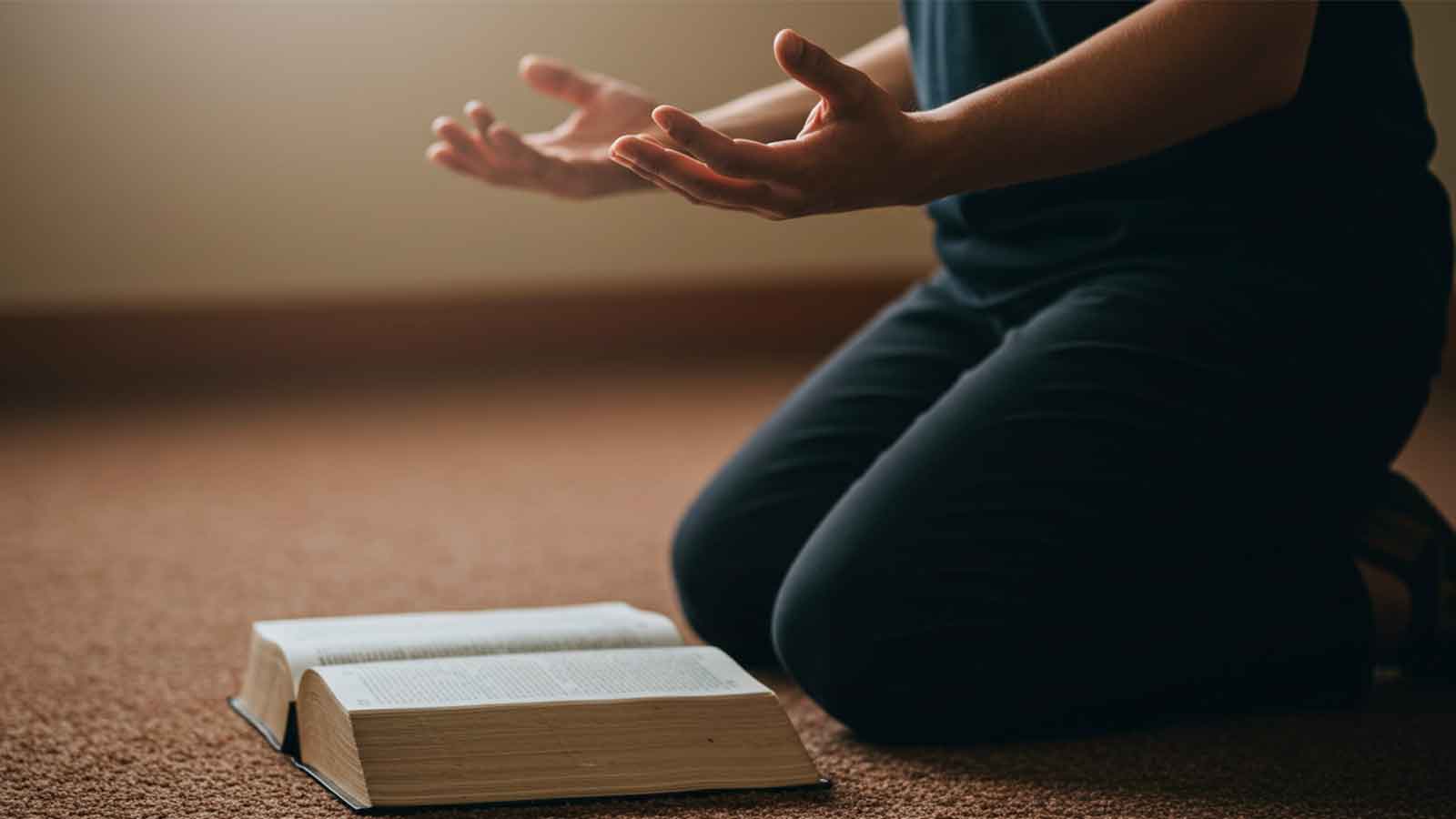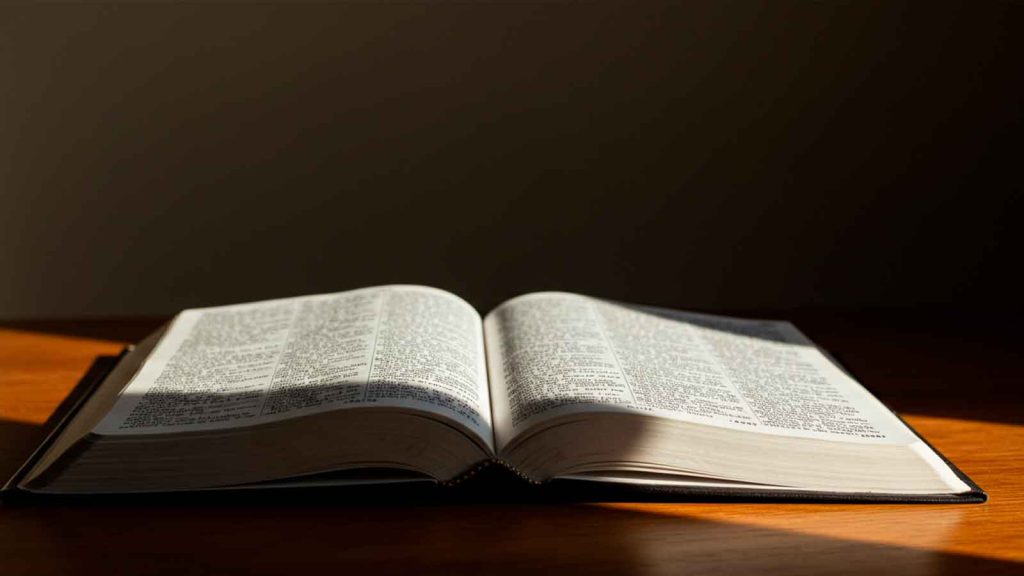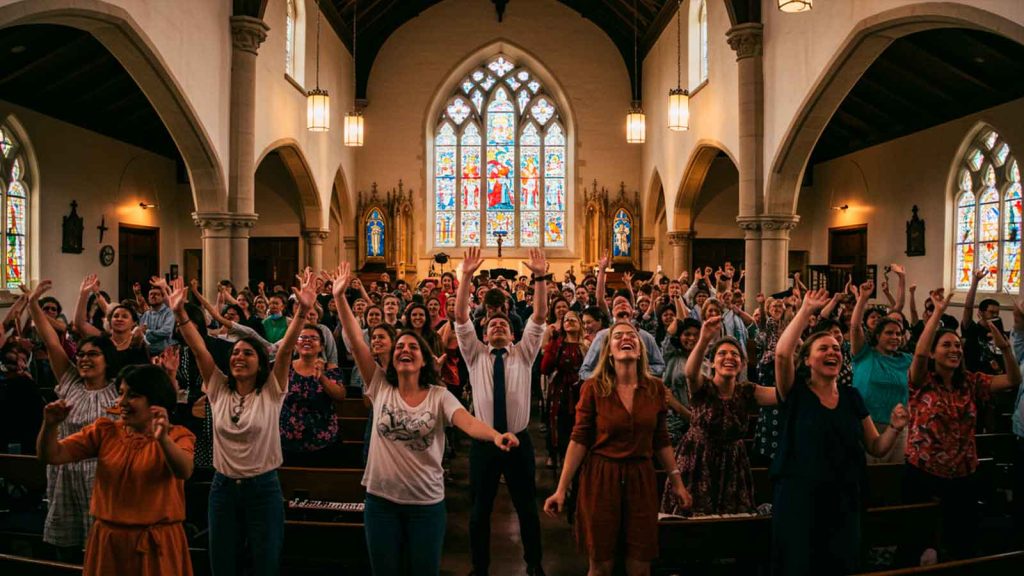Psalm 149 is one of the final songs in the Book of Psalms and stands out as a vibrant invitation to worship and to celebrate the victory God grants His people. It weaves together joy, dance, praise, and justice, calling the faithful to praise with enthusiasm and gratitude.
In this article, we will explore every detail of Psalm 149, from its central message to the spiritual application that can transform the daily life of those who read it. Discover why this psalm is so powerful, how it inspires believers to exalt God with intensity, and what lessons it offers about genuine worship.
Psalm 149 Complete
¹ Praise the Lord. Sing to the Lord a new song, and His praise in the assembly of the saints.
² Let Israel rejoice in their Maker; let the children of Zion be joyful in their King.
³ Let them praise His name with dancing; let them sing praises to Him with tambourine and harp.
⁴ For the Lord takes pleasure in His people; He will beautify the meek with salvation.
⁵ Let the saints rejoice in glory; let them sing aloud on their beds.
⁶ Let the high praises of God be in their throats, and a two-edged sword in their hands,
⁷ To execute vengeance on the nations and punishments on the peoples;
⁸ To bind their kings with chains and their nobles with fetters of iron;
⁹ To execute on them the written judgment; this is the honor of all His saints. Praise the Lord.

Psalm 149 Explained – Study
Psalm 149:1
Praise the Lord. Sing to the Lord a new song, and His praise in the assembly of the saints.
The psalm opens with a call to corporate worship. The “new song” represents renewed, heartfelt praise born from a fresh encounter with God. The invitation to sing in “assembly” underscores the power of collective praise among believers, making worship even more powerful when shared. It is a summons to unity, celebration, and the constant renewal of the heart before God.
Psalm 149:2
Let Israel rejoice in their Maker; let the children of Zion be joyful in their King.
This verse highlights the reason for joy: God is Creator and King. Israel is reminded of its divine origin, and the people of Zion are encouraged to rejoice in the sovereign rule of the Lord. True spiritual joy arises from recognizing that we belong to a God who created us, rules us with justice, and cares for us with constant love.
Psalm 149:3
Let them praise His name with dancing; let them sing praises to Him with tambourine and harp.
Here we see worship expressed through movement and music. Praise is not only verbal but also bodily and artistic. Dancing, playing instruments, and singing are legitimate ways to express joy before the Lord. This verse reinforces that worship can be lively, enthusiastic, and beautiful, involving our whole being in celebrating God’s name.
Psalm 149:4
For the Lord takes pleasure in His people; He will beautify the meek with salvation.
God finds delight in His people and shows it with a precious gift: salvation. The “meek” represent the humble and obedient, who do not exalt themselves but trust in the Lord. Salvation is described as an ornament, something that beautifies and honors those who receive it. This verse reveals God’s gracious care for those who live humbly before Him.
Psalm 149:5
Let the saints rejoice in glory; let them sing aloud on their beds.
The saints are invited to rejoice even while resting, for God’s glory accompanies them at all times. The joy mentioned here is continuous, not dependent on circumstances. Even lying down, in silence, there is room for inward praise. It is an image of deep peace, where the Lord’s glory fills the heart and produces rejoicing in the quietest hours.
Psalm 149:6
Let the high praises of God be in their throats, and a two-edged sword in their hands.
This verse unites worship and spiritual authority. Praise on the lips indicates constant devotion, while the “two-edged sword” represents the power of God’s Word. It portrays a people who praise fervently and live with discernment, combating evil with faith and obedience. The image evokes spiritual vigilance and firmness in divine justice.
Psalm 149:7
To execute vengeance on the nations and punishments on the peoples;
The language here is symbolic, indicating God’s action through His people. The vengeance is not personal but an execution of divine justice against those who oppose the truth. The “punishments” signify correction and judgment according to God’s will. The faithful are seen as instruments of the Lord to establish order, righteousness, and correction among the nations.
Psalm 149:8
To bind their kings with chains and their nobles with fetters of iron;
This image reinforces the spiritual authority granted to the saints. Kings and nobles represent earthly powers that oppose God. Binding them symbolizes the submission of all leadership to divine sovereignty. The Lord’s justice reaches every level of society, and His people participate in this process with reverence, knowing that true authority belongs to the King of kings.
Psalm 149:9
To execute on them the written judgment; this is the honor of all His saints. Praise the Lord.
The psalm closes by declaring that fulfilling God’s will is an honor for the saints. The “written judgment” refers to the justice already revealed in Scripture. Taking part in its fulfillment is a special dignity for the faithful. The final praise reaffirms the psalm’s main focus: worship the Lord with all your heart, acknowledging His justice, His glory, and His eternal authority.

The Poetic Structure of Psalm 149
Psalm 149 consists of nine verses that blend praise, jubilation, exaltation of God, and a call to justice. Its literary composition is typical of the final psalms, with exalted language and strong emotional charge. The concluding psalms (146–150) are traditionally called “Hallelujah” psalms because they begin and end with the phrase “Praise the Lord.”
The New Song
Right from the start, Psalm 149 summons the faithful to sing “a new song,” suggesting spiritual renewal and constant worship that goes beyond religious routine. Praising with a new song symbolizes a renewed and grateful heart.
Praise in the Congregation
Another essential aspect of the psalm is collective praise. The psalmist encourages God’s people to praise “in the assembly of the saints,” showing that worship is even more powerful when shared among the righteous. This highlights the importance of fellowship and united worship.
The Importance of Joy in Worship
Worship in Psalm 149 is marked by joy and movement. It speaks of dancing, singing, and playing instruments, revealing that praise to the Lord is not cold or merely ceremonial but should be experienced with one’s whole being.
Dance and Instruments
The text mentions the tambourine and harp, musical instruments common in Hebrew worship. This resounding joy represents the celebration of victories and blessings granted by God.
The Joy of God’s People
By stating that “the Lord takes pleasure in His people,” the psalm makes it clear that authentic praise touches the divine heart. This underscores the value of sincerity in worship.

Victory Granted by God
Psalm 149 also speaks of spiritual victories. It mentions that God adorns the humble with salvation and that the faithful, with a two-edged sword in their hands, execute justice against the nations. This is rich spiritual symbolism about the authority God grants.
The Justice of the Saints
The text uses battle imagery to symbolize the struggle against the forces of evil. The sword symbolizes the Word of God and the believers’ authority to live in righteousness and truth.
The Honor of the Faithful
At the psalm’s end we read, “this is honor for all His saints.” In other words, taking part in God’s justice is a cause of glory for those who serve the Lord faithfully.
Applications of Psalm 149 for Today
The message of Psalm 149 remains current. It invites us to live with joy, gratitude, and faith even in difficult times. It also shows that true worship involves heart, body, and soul.
Worship That Engages the Whole Body
The dance mentioned in the psalm shows that praising can also be a physical act. Engaging the body in worship is not excessive but a legitimate expression of spiritual joy.
The Power of Collective Praise
In the modern era, where many isolate themselves spiritually, Psalm 149 reminds us of the importance of congregation. Praising in community builds faith and strengthens bonds with other servants of God.
Connections with Other Psalms
Psalm 149 connects strongly with the other final psalms, such as Psalm 150 and Psalm 148, because they all share the theme of universal praise. They powerfully celebrate God’s majesty with joy and strength.
Psalm 150
Psalm 150 further expands the call to praise with instruments and all creation. Together, they form a climax of worship in the Book of Psalms.
Psalm 148
Psalm 148 summons heavens, earth, creatures, and kings to praise the Lord. Psalm 149 focuses more on the saints and the congregation, highlighting the role of the faithful.
Tips for Using Psalm 149 in Prayer
Incorporating Psalm 149 into your spiritual routine can enrich your time with God.
Read It Aloud
Reciting the psalm aloud creates a deep connection with its words. The sound of praise strengthens faith and inspires the soul.
Sing It as a Prayer
Turning the verses into song, even a simple one, is a powerful form of prayer. This psalm already invites a new song, so take advantage of it!
Meditate Verse by Verse
Set aside time to reflect on each phrase. Write down what most touches your heart and how it can be applied to your life.
FAQ about Psalm 149
What is the main theme of Psalm 149?
The central themes of Psalm 149 are community praise, the celebration of spiritual victory, and divine justice.
Why does the psalm mention a sword and vengeance?
These are spiritual metaphors for the battle between good and evil. The sword represents the Word of God and the divine authority granted to the saints.
Is Psalm 149 used in worship services?
Yes, especially during times of collective praise. Its language invites active and vibrant celebration.
How can we apply Psalm 149 today?
We can apply it by living with joy, praising in community, and trusting God’s justice in every situation.
What does “new song” mean?
It represents renewed, sincere worship that flows from a heart transformed by God’s presence.
READ ALSO:
- Psalm 147: A Song of Praise to the God Who Restores
- Psalm 146: Trust in the Lord Who Reigns Forever
- Psalm 145: Praise to the Greatness and Goodness of God
- Psalm 144: Confidence in God in Life’s Battles
FOLLOW US ON FACEBOOK